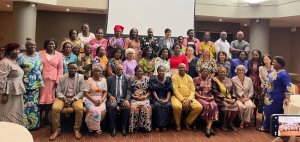Improving midwifery capacity and standards to curb death of mothers and babies
Over 80 maternal and child health experts from around the world have concluded a meeting in Freetown aimed at improving midwifery education. The body of experts included health authorities of Sierra Leone, Malawi, Bolivia, Pakistan and India, WHO and other global health partners. Their deliberations focused on finding workable strategies that will help strengthen the quality of midwifery education and training to improve standards that will help curb preventable death of mothers and newborn babies.
Preventable death of mothers and young children is still a big public health challenge in many low and middle-income countries including the participating countries.
In 2010, Sierra Leone introduced the Free Health Care Initiative to enhance universal access to quality health care for pregnant and lactating mothers and children under the age of 5 years. The Initiative and other national strategies have contributed in improving coverage of essential services for these categories of beneficiaries.
Meanwhile, the Sierra Leone Demographic and Health Survey (DHS 2019) showed that approximately 83% of all childbirth take place in health facilities, and about 87% of these are assisted by skilled healthcare providers.
However, statistics on the burden of the country’s maternal and child mortality rate is still grim and remains among the highest in the world. The rate of maternal mortality is estimated at 717 out of every 100,000 livebirths (2019), while neonatal mortality is estimated at 31 out of every 1000 live births.
“Sierra Leone has a lot of experiences to share on maternal and child mortality and at the same time has a lot to learn from experiences and lessons from other parts of the world to help curb the perennial and unacceptably high death of women in childbearing age and babies”, says Dr Steven Shongwe, WHO Representative in Sierra Leone.
“We can change this narrative now than later because we have the opportunity and tools to do so. We have evidence-based policies, strategies, guidelines, standards, and best practice. However, we now must be intentional and challenge ourselves to improve institutional capacities for midwifery education and training to transform health services delivery that will save the lives of women during childbirth and of children at the start of life”, Dr Shongwe added. He emphasized the need for strategic investment in human resources for health, equipment, medicines, and supplies.
Through the financial support of MSD for Mothers Foundation WHO, UNICEF, UNFPA and other partners are providing technical assistance to countries to implement programmes aimed at enhancing public-private sector partnership to bolster investment in strengthening human resources, and institutional capacities to enable health facilities provide optimal quality health care including obstetric care when and where they are needed to achieve universal health coverage.
In 2019, WHO launched the Framework for Action to Strengthening Quality of Midwifery Education for Universal Health Coverage 2030. The Framework sets out steps to be adapted by countries to develop and strengthen their national human resources for health strategies including strengthening quality midwifery capacities.
WHO works very closely with multiple partners including the UNFPA, UNICEF, other UN agencies, Donors and Development partners to support the Ministry of Health and Sanitation to advocate, mobilize resources and act jointly to reach the required number of trained and qualified midwifes and related health professionals that Sierra Leone needs.
Some of the major outcomes of this meeting will lead to improved midwifery coordination, regulation, capacities and functionality in Sierra Leone and the other participating countries.



